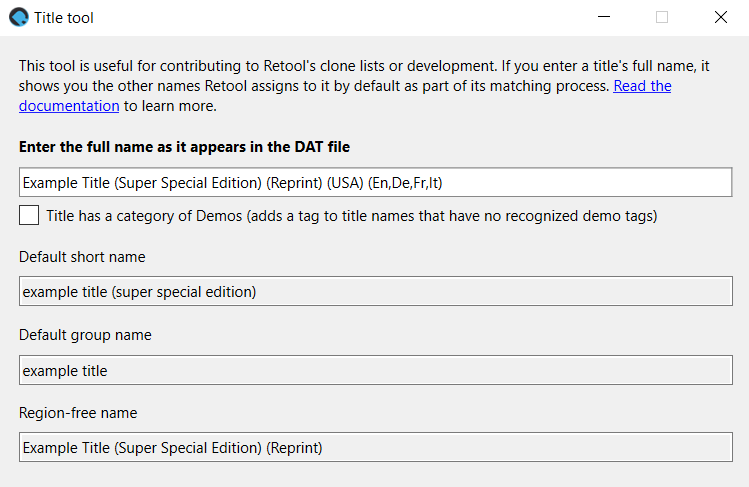Retool's naming system
Retool generates multiple names for each title in a DAT file to help match and group together titles more accurately. These names are used directly in the code, and also clone lists. If you plan to contribute to Retool, it helps to understand this standard.
Title tool
Retool's different naming conventions can take a while to get used to. To help you start, you can use the title tool in Retool GUI. Open Retool GUI, then click File > Title tool to launch it. Paste in the full name you've found in the DAT file you're working on, and it shows you the other names Retool assigns to that title by default.

Full names
Full names are the names of titles as presented in the DAT file, including tags. For example:
Short names
Short names are a shortened version of full names, most often used in clone lists as a handy way to reference many titles at once without having to list the full name of every variant.
For example, all of the following title full names:
This is a title (USA) (En,Fr) (Disc A) (Best Collection)
This is a title (Canada) (Disc 1)
This is a title (Europe) (De,It) (Disc A)
This is a title V3 (Spain) (Disco Uno)
Have the following short name:
Adding this short name to a clone list finds all the full name titles previously listed.
A short name is built by making the following changes to the full name:
-
Normalizing disc names. Retool attempts to align all naming variants for discs to the one standard for better automated matching of titles. That is, variants like (Disc 1), (Disc A), (Disco Uno), and (Side A) are all (Disc 1) as far as Retool is concerned. Normalized disc names should also be used in clone lists wherever short names are used.
The replace strings for normalized disc names are in the
disc_renameobject inconfig/internal-config.json. This is not a 1:1 mapping of what the disc name is and what it should be. Instead, it's a sequential set of string replacements that's iterated over when processing a title's full name, so the order is important. -
Removing tags and version-like strings as defined in the
ignore_tags,promote_editions,demote_editions, andmodern_editionsarrays inconfig/internal-config.json. -
Removing regions and languages.
-
Converting the name to lowercase.
The short name also acts as a differentiator for titles that get bundled into the same group, but shouldn't be treated as 1:1 matches.
For example, the following full names:
This is a title (USA) (En,Fr) (Disc A) (Best Collection)
This is a title (USA) (En,Fr) (Disc B) (Best Collection)
Are both assigned to the same group by default:
However, because they are different discs from the same set and not equivalent titles, they get assigned different short names:
This prevents them from being considered as clones of each other.
Group names
Group names are how Retool bundles together similar titles to compare against each other.
By default, group names are discovered by Retool taking only the content before the
first ( in full names, and then converting to lowercase. Additionally, any string that
looks like a version is removed.
For example, the following full names:
This is a title v1.00 (USA) (En,Fr) (Disc A) (Best Collection)
This is a title v1.00 (USA) (En,Fr) (Disc B) (Best Collection)
Are both assigned to the same group by default:
Group names can also be set manually in the variants
array in a clone list.
Region-free names
Region-free names are the same as full names, except their regions and languages have been removed. They're used in clone lists when specifying a short name or using a filter isn't appropriate.
For example, the following full name:
Has the following region-free name: